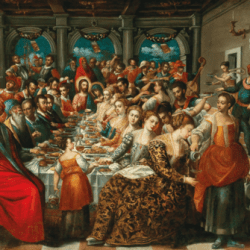
This post is not about “mental reservation.” This is about how it’s entirely possible to have all the wonder and magic of playing at Santa Claus — I maintain more wonder and magic — while still being entirely frank with your kids about the fact that it’s a game. A very good game.
How We Got Here
My husband and I were still fairly new Christians when our first was born. We took our newly rediscovered faith extremely seriously (as we do still) because we were keenly aware of how easily it could be lost, or fail to be transmitted.
A fellow at work advised my husband, “Don’t lie to your kids about Santa and the Easter Bunny. Sometimes people lose their faith that way: They discover their parents were lying to them about one thing, and gather that the big reveal about God being all just a happy myth is the next thing coming.”
Does it happen to everyone? No, obviously not. But it was advice that struck a chord with us, and we took it.
I myself never had any particular trauma in this regard. My mother and Santa had the same handwriting. It was a seamless transition. I also don’t recall my parents ever overtly lying about this. They just played the game and let us figure it out at our own pace.
What We Tell the Kids
Very simply: Saint Nicholas is a real person who lived on earth centuries ago, and now lives in Heaven with Jesus. [Insert saint information as appropriate.] Santa Claus is a big, fun, wonderful game we play, in which we all get to be St. Nick for a bit. Also, don’t wreck the game by going around saying it’s just a game. It upsets people, and anyway, who does that?
Why It Doesn’t Ruin Their Childhood
Children have vivid imaginations. They live in pretend worlds most of the time. They don’t have any difficulty slipping into a very good fairy story. It’s what children do. If, for a month or so, even the grown-ups get in on a game, all that means is that the adults have finally refound their sanity for a bit.
Think about a fairy story that you love. Something grown-up, like Lord of the Rings or Roman Holiday. Before you put in the DVD, do you require your spouse to firmly reassure you that Audrey Hepburn really is a princess? Do you ever feel the need to ask a friend, knowing that if the answer is negative you’ll never look at another elf as long as you live, “Is Middle Earth real?”
Nope. It turns out grown-ups have the ability to suspend disbelief just like kids do; we just need more help at it.
When You Know the Game, You Can Be In the Game
So let’s pretend for a moment that you are, say, a Downton Abbey fan. There’s a fun show for you, if you like castles and period clothing and tortured romance. Since we’re pretending, let’s say that it’s not just a show you kinda like, but it’s a show that you love, passionately. You sit at meetings staring into space trying to figure out what hat you’d wear if you were invited to tea with the Crawleys.
Now imagine that the producers called and said, “We’d like to invite you to tea with the Crawleys. No horrid hours spent under the lights doing 10,000 takes. Just come get suited up in something fabulous put together by our wardrobe department, and then come have tea.” And you go, and it all runs exactly as you hoped, only better. You are no longer a passive dreamer — you get to play an active part in it all. Lady Edith finally does something sensible for a change, thanks to you.
Receiving money from the tooth fairy is sorta fun. Putting on fairy dresses and wings and creeping into your sister’s bedroom late at night while she holds her eyes shut tight and pretends to be sleeping? Even more fun.
Kids who believe in Santa are relegated to being mostly passive players in the Santa game. They get to write a list, they get to sit around hoping, they get a morning of excitement. Kids who are in on the game, who get to be Santa, get to play the whole game. They get to be the recipient, but they also get to be the giver. Because they are kids, they’ll play it for a month before and after, making 10,000 little gifts for their stuffed animals, and hosting parties, and putting on the Santa hat.
Fiction is Good Because It’s True
The magic of fiction doesn’t lie in our being persuaded that fiction is fact. It’s a cheap sort of magic to say that Tolkien’s only any good if you read it for the first time being persuaded it’s actual history. The magic, rather, lies in our knowing that underneath the pretend there’s a deeper truth that resounds within us.
Santa is a brilliant, marvelous, wonderful game because it is true in the deeper sense: It speaks of beauty and goodness and the hope that one day we’ll all grow up and get to punch Arius.
You can let your kids in on the game from the beginning. They’re made for these games. They’ll know what to do.
Related:
Image: Fra Angelico,Story of St Nicholas: Birth of St Nicholas (detail), Tempera on wood Pinacoteca, Vatican, [Public domain], via Wikimedia Commons
















